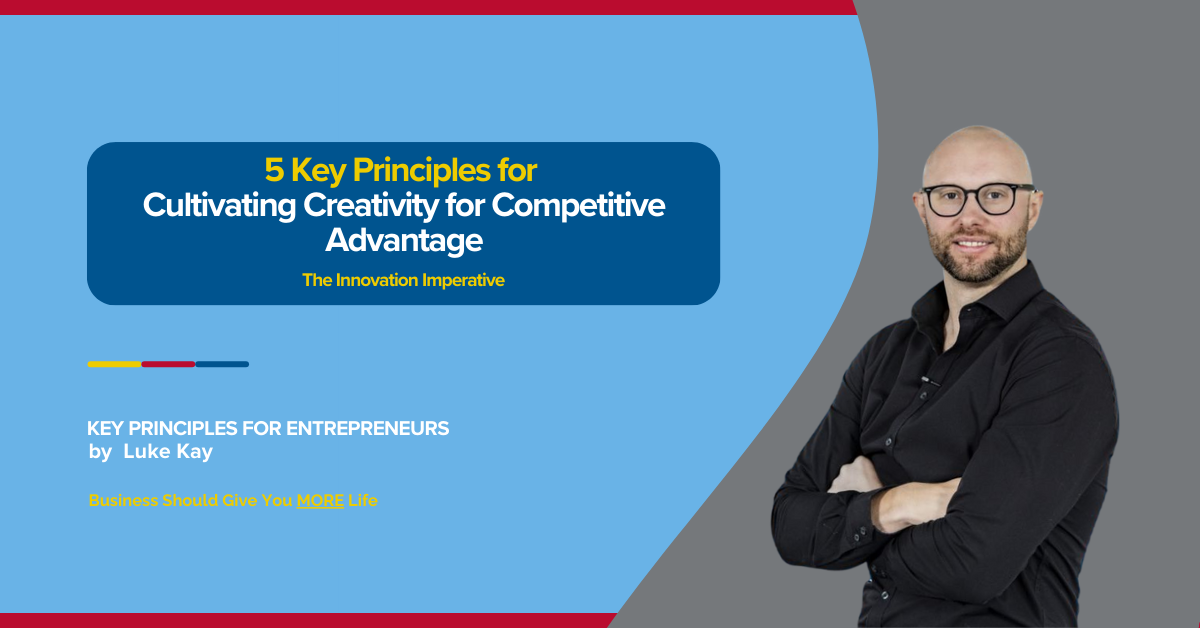
In today’s rapidly evolving business landscape, innovation is not just an advantage – it’s a necessity for survival and growth.
The ability to consistently generate and implement creative ideas can set your business apart in crowded markets. Let’s explore how to cultivate a culture of innovation and harness creativity for competitive advantage, drawing inspiration from some of the UK’s most innovative entrepreneurs and companies.
Key Principle #1: Encourage a Culture of Curiosity
Innovation begins with curiosity. Successful entrepreneurs create environments where questioning the status quo is encouraged.
Implement regular ‘curiosity sessions’ where team members can explore new ideas. Encourage cross-departmental knowledge sharing.
Reward inquisitiveness and experimentation.
Key Principle #1 Case Study: Arm Holdings’ Culture of Exploration
Arm Holdings, the Cambridge-based semiconductor and software design company, has built its success on a culture of curiosity and exploration.
Under the leadership of founders like Tudor Brown and Jamie Urquhart, Arm cultivated an environment where engineers were encouraged to question existing technologies and explore new possibilities. This culture of curiosity led to groundbreaking innovations in mobile chip design, positioning Arm as a global leader in the tech industry.

Key Principle #2: Embrace Failure as a Learning Opportunity
Innovation inherently involves risk and potential failure. High-performing innovators view failures as valuable learning experiences.
Implement a ‘fail fast, learn fast’ approach to projects. Celebrate lessons learned from failures as much as successes.
Create safe spaces for team members to take calculated risks.
Key Principle #2 Case Study: Dyson’s 5,127 Prototypes
Sir James Dyson’s journey to creating his revolutionary bagless vacuum cleaner is a testament to embracing failure.
Dyson famously created 5,126 failed prototypes before succeeding. Rather than being discouraged, he viewed each failure as a step closer to success. This attitude towards failure has become a cornerstone of Dyson’s innovative culture, leading to continuous breakthroughs in various product categories.

Key Principle #3: Leverage Diverse Perspectives
Innovation thrives on diversity of thought. Successful innovators actively seek out and incorporate diverse perspectives.
Build diverse teams with varied backgrounds and skill sets. Implement systems for gathering ideas from all levels of the organisation. Seek input from customers, suppliers, and even competitors.
Key Principle #3 Case Study: Innocent Drinks’ Crowdsourced Innovation
Richard Reed, Adam Balon, and Jon Wright, founders of Innocent Drinks, have long recognised the power of diverse perspectives in driving innovation.
Innocent regularly crowdsources ideas from customers, employees, and the public. Their ‘Innocent Big Knit’ campaign, which invites people to knit tiny hats for their smoothie bottles, is not only a creative marketing initiative but also a source of product and social responsibility ideas.

Key Principle #4: Create Time and Space for Innovation
Innovation doesn’t happen in a vacuum. It requires dedicated time and space free from day-to-day pressures.
Implement ‘innovation time off’ policies where employees can work on passion projects. Create physical spaces in your office designed for creative thinking and collaboration.
Key Principle #4 Case Study: DeepMind’s ‘20% Time’
DeepMind, the London-based AI research laboratory acquired by Google, has adopted a ‘20% time’ policy similar to Google’s.
This policy allows researchers to spend 20% of their time on personal projects. This approach has led to numerous breakthroughs, including the development of AlphaFold, an AI system that has made significant advancements in protein folding prediction.

Key Principle #5: Implement Systematic Innovation Processes
While creativity can seem spontaneous, systematic processes can help consistently generate and implement innovative ideas.
Adopt methodologies like Design Thinking or TRIZ (Theory of Inventive Problem Solving). Implement regular innovation reviews and idea management systems.
Key Principle #5 Case Study: Rolls-Royce’s Innovation Management
Rolls-Royce, despite being in a traditional industry, has remained at the forefront of innovation through systematic processes.
The company uses a structured approach to innovation management, including regular ‘Innovation Challenges’ and a comprehensive idea evaluation system.
This systematic approach has enabled Rolls-Royce to consistently innovate in areas like jet engine design and power systems.

Implementing Your Innovation Strategy
Cultivating creativity and driving innovation is an ongoing process.
Here are some steps to get started:
- Conduct an ‘innovation audit’ of your current practices and culture.
- Implement a system for capturing and evaluating ideas from all levels of your organisation.
- Dedicate time in your schedule for creative thinking and exploration.
- Start celebrating ‘noble failures’ – unsuccessful projects that provided valuable learnings.
- Invest in training your team in creative problem-solving methodologies.
Remember, innovation isn’t about occasional flashes of brilliance, but about creating an environment where creativity can flourish consistently.
What’s one area of your business where increased innovation could provide a significant competitive advantage?
Ready to supercharge your innovation and gain a decisive competitive edge?
Book a Complimentary Business Discovery Call with me.
We’ll assess your current innovation practices, identify key opportunities for improvement, and develop a customised strategy to cultivate creativity and drive innovation in your business.
Don’t let a lack of innovation hold your business back – let’s unlock your full creative potential and lead your industry into the future!
Events
We hold events on a monthly basis as part of our Entrepreneurship Academy and 1-2-1 Business Coaching.
If you want to attend one of our events for FREE and meet the rest of the entrepreneurs in our business growth community then please feel free to check out our events page or book onto our next ActionCOACH Business Growth workshop or our Annual Strategic Planning Day – Kickstart to 2025 by clicking on our events page here.





